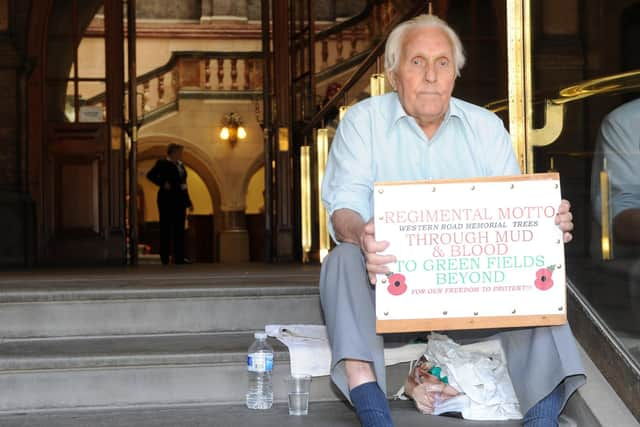Family pay tribute to ‘much-loved’ Sheffield protester who helped save memorial trees
and live on Freeview channel 276
Roy Parkin Millington, who was 85 and a retired tiler, died on May 18 last year in Northern General Hospital after suffering pneumonia.
Assistant coroner Stephen Eccleston heard that on May 15 paramedics were called by his carers to his home on Den Bank Crescent after he was found on the floor of his bedroom having fallen 12 hours previously.
Advertisement
Hide AdAdvertisement
Hide AdHe was taken to hospital, where he was treated for numerous illnesses he suffered from in his old age, before he died three days later of pneumonia brought about by lung diseases sarcoidosis and pulmonary fibrosis.


A well-known character in Sheffield between 2016 and 2018 Mr Millington made headlines when he staged a protest against Sheffield City Council’s plans to fell 23 memorial trees on Western Road in Crookes.
He spent ten hours a week protesting outside the Town Hall as well as protesting outside the law courts and on Western Road itself.
He did these protests on his own and as part of the action group Western Road Remembers.
Ultimately, the group managed to save 20 of the trees.
Speaking at the inquest, Patricia Millington, the wife of Mr Millington’s nephew David, said: “Roy could be cantankerous, but he had very strong beliefs and anything he felt passionate about he threw himself into 100 per cent.
Advertisement
Hide AdAdvertisement
Hide Ad"He refused to give up that protest and he went some way towards getting SCC to change their mind about the trees.”
She added: "He was a stubborn character but he was somebody with values and opinions and he cared about the world around him.”
The inquest also heard that Mr Millington, who was mobile only for short distances and with a frame, had been living in poor conditions and his house was in a state of serious disrepair.
Reports from carers from Careline, who began seeing him on May 11 2020, read out by manager Michelle Thistlewhite, said that he was living in one upstairs bedroom and that his house did not have central heating or hot water.
The reports said that he would often refuse help from the carers who visited him four times a day for the three days they were employed to do so.
Mrs Millington raised concerns about his living conditions.
Advertisement
Hide AdAdvertisement
Hide AdSpeaking at the inquest, she said: “When he went into hospital [May 15] we went up to his house to get it freshened up for him.
"When we walked into the house the smell was so bad I gagged. It was awful. I actually cried because I thought an elderly gentleman shouldn’t be living like this.
"The commode was full to the top. In the corner by the window there was a box of tinned food and on top of that there were soiled bedsheets that were wet.
"The sheets on his bed were wet. In the end we took all of it and burned it and went and bought fresh sheets and deep cleaned the bedroom and the bathroom.
Advertisement
Hide AdAdvertisement
Hide Ad"We thought he was going to really like it when he got home and then he never came home.”
Assistant coroner Eccleston found that Mr Millington had the capacity to make the decision to live in the conditions in which he did, and to refuse help from carers.
He found that Mr Millington died of pneumonia as a consequence of lung diseases.